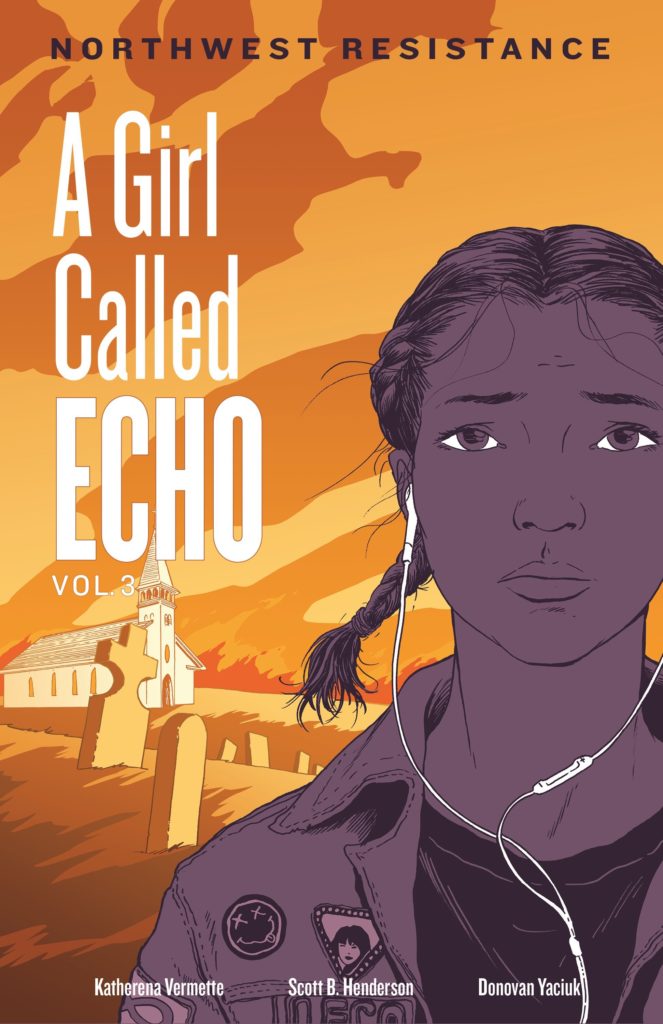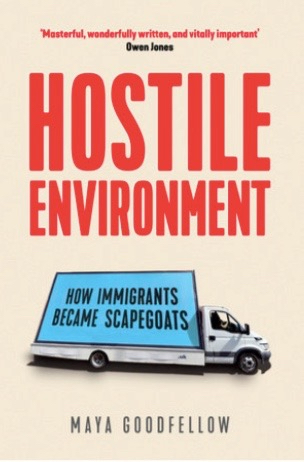Northwest Resistance: A Girl Called Echo (Volume 3), Katherena Vermette (Author), Scott B. Henderson (Illustrator), Donovan Yaciuk (Illustrator)
Hostile Environment: How Immigrants Became Scapegoats by Maya Goodfellow
History is alive
By Gail Picco (March 6, 2020)
Northwest Resistance: A Girl Called Echo (Volume 3), Katherena Vermette (Author), Scott B. Henderson (Illustrator), Donovan Yaciuk (Illustrator), HighWater Press, February 25, 2020, 48 pp., $18.87
Echo Desjardin is no ordinary 13-year-old Métis girl.
Living with new family and attending a new school, worry and sadness lie heavily on her shoulders and, like Superman, she is a motherless child, having lost her mother in childbirth. History is her favourite subject. Her playlist is loaded with songs by the band Rage Against the Machine.
Echo is also a time traveller.
And Echo’s time travel doesn’t lighten her load.
Northwest Resistance is the third volume in Katherena Vermette’s graphic series A Girl Called Echo. Vermette is a Métis writer from Treaty 1 Territory in Manitoba. Her first book North End Love Songs won the Governor General’s Literary Award for Poetry. Her novel The Break won 2017 Amazon.ca First Novel Award. She is ably assisted in A Girl Called Echo by Scott Henderson, author and illustrator of the sci/fi fantasy, The Chronicles of Era and colourist, Donovan Yaicuk, who has worked on books published by Marvel and D.C., in addition to a great book featured in this space last year called This Place: 150 Years Retold.
Northwest Resistance places Echo in the lead-up to the Battle of Batoche, the culminating battle of the Northwest Rebellion at Batoche, Saskatchewan between 250 Métis and Indigenous fighters, and just over 900 Canadian troops and militia men, which took place between May 9 and 12, 1885.
Victories in smaller skirmishes at Duck Lake, Fish Cree and Cut Knife leave the Métis force feeling bullish about their chances of further success. But being a student of history, Echo knows how badly it all ends up, and with no Prime Directive here, she desperately tries to warn her rebel friend Josephine off the fight,
Josephine: Mon amie, there you are, did you hear about what happened at Duck Lake?
Echo: It’s too dangerous Josephine! You don’t understand. You have to stop! Before it’s too late.
Josephine: Mon dieu! Don’t you have any hope? You have to have hope. Dumont has a plan. Riel is working too. We are in the right.
Echo: But people are dying!
Josephine: But if we don’t do this, how will we live?
Echo returns to 2020 with a heavy heart. She knows her friends will be hurt.
And the Battle of Batoche did result in causalities—16 Métis fighters died and 30 were wounded; on the Canadian side 8 died and 46 were wounded. Louis Riel was found guilty of treason and hanged in November 1885. Gabriel Dumont moved to Montana and did not return to Batoche until 1890.
The weight of history is heavy.
But when she returns to 2020, Echo finds something to calm her worry, to take some of the weight off her shoulders. I encourage you to dive into this great new work to find out what that is.
There is a profusion of excellent titles coming out in graphic format, particularly from Indigenous authors. Northwest Resistance: A Girl Called Echo is another one to add to the list.
More stories of Echo Desjardins are available including Volume 1, Pemmican Wars: A Girl Called Echo (2017) and Volume 2, Red River Resistance: A Girl Called Echo (2019)
Gail Picco is editor-in-chief of The Charity Report.
The bleak irony of anti-immigrant sentiment
By Joanne Linka (March 6, 2020)
Hostile Environment: How Immigrants Became Scapegoats, Maya Goodfellow, Verso Books: December 17, 2019, 272 pp., $21.62
According to Maya Goodfellow, Britain has an immigration problem. Her view of the problem is quite different than what she suggests British culture would see as the “immigration problem.”
While the average Briton might consider the “immigrant problem” to involve too many immigrants entering the UK, in Hostile Environment: How Immigrants Became Scapegoats, Goodfellow presents a comprehensive and well-researched book about all the ways Britain has developed and manifested racism and anti-immigration sentiment, stating that,
Racism was woven into the structures of British society…there is a collective denial about the bloodiness of its empire and the embeddedness of the country’s domestic history in global interdependencies.”
She believes the “immigrant problem” is not about how many immigrants are allowed in, but how immigrants are mistreated and marginalized.
Anti-immigrant sentiment is evident most clearly in government policy, from the amount of money required to become a resident (which, with its high cost, eliminates those who are emigrating from poorer nations) to the types of immigrants that are welcomed into the country.
If an applicant comes from Canada, New Zealand or Australia, they are more welcome and have fewer hoops to jump through than those from other Commonwealth countries, such as India, Pakistan or Jamaica. The colour of the applicant’s skin – and the wealth they bring – has a direct correlation to whether or not they are welcomed. Yet, for many of these poorer nations, their poverty is as a result of the global inequality that has been produced and entrenched by the colonialism of Britain and other wealthy nations.
Through crippling debt and colossal interest rates, unfair trade deals, war and global corporations being given carte blanche to plunder natural resources all over the world, money flows out of poorer countries and into richer ones.”
It is no wonder that the local inhabitants seek a safer and more productive place to live and raise their families.
The anti-immigrant sentiment in the UK, fed by the press and government, is ironic as their nation was made by immigrants, as is true of many nations. Immigration didn’t just occur after 1945, but has been happening for centuries, with people coming from all over the world to build Britain into the nation it is today.
Goodfellow lays out the political decisions that further entrenched the hostile environment that immigrants face today in Britain. She has spoken to politicians and policy makers, but also to immigrants and those who provide services to immigrants, coming to the conclusion that:

Anti-immigration politics does not manifest itself in neat and contained ways and there are no easy answers for how to challenge it. But considering how people think and talk about immigration is a good starting point. We can learn much more about problems in the world by examining structural inequalities produced by capitalism that we ever will from treating immigrants, rich or poor, as the issue.
Hostile Environment is an extremely well written and researched book that comprehensively covers the issue of immigration in the UK. As Canadians – and members of the Commonwealth – we share a common history with the UK and have undoubtedly been influenced by their policies. The question is, how similar or different are we?
(Joanne Linka is Manager of Communication and Fund Development at The Cridge Centre for the Family in Victoria BC – the oldest running charity in Western Canada.)

